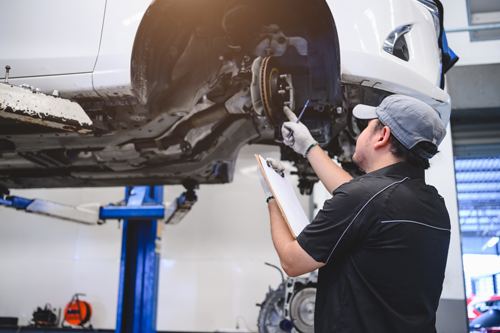The most important safety feature in any moving vehicle is the one that allows the driver to stop — the brakes. Nearly a third of all car crashes are rear-end collisions, most of which could be prevented if drivers paid more attention to traffic conditions and kept their brakes operating at maximum efficiency.
All too often, drivers rely on the warning lights on their dash to tell them when it’s time to take their car in for needed maintenance, such as an oil change or a tune-up. But brake warning lights won’t always tell you when your brakes are seriously worn. And since driving styles vary greatly and have a definite impact on how long brake components last, there’s no standard measure for how often those parts should be replaced; mechanics will tell you that the brake pads should be replaced after 25,000 to 65,000 miles, while rotors can last from 30,000 to 70,000 miles. That’s quite a spread.
Fortunately, you can use your own powers of observation to monitor your brake situation. Here are five tell-tale signs that it’s time to see a brake specialist.
1. The brake pads are as thin as diet mints:
In many car models, the brake pads are open to visual inspection; just locate the shiny metal piece (the rotor) peeking through the hub of the wheel and follow the edge of the rotor until you see the brake pads, gripping the rotor like a vise. The pads should be at least a quarter-inch thick. If they’re not, it’s time to replace them.
2. Your car is hitting the high notes:
Strange noises are another reason to get your brakes checked. That shrill squeal is probably generated by a wear indicator that makes metal-on-metal contact with the rotor when the brake pads get worn down. It’s the car’s way of telling you to replace the pads.
3. You’re picking up bad vibrations:
Does your car shake, rattle and roll when you stop? That could be a sign of a warped rotor, a frequent problem in vehicles subjected to intense braking (when going down a mountain, for example).
4. You don’t want to turn, but your car does:
You haven’t touched the wheel, but the car seems to have its own turning inclinations. This could be a sign of a stuck caliper, a mechanism that presses the brake pads against the rotor. A problem caliper on one side will make the wheels spin at different rates, affecting the car’s direction.
5. Your brake pedal is as mushy as Grandma’s oatmeal:
If you have to practically stand on your brake pedal to get your vehicle to stop, you could be experiencing a leak in the hydraulic system that operates the brakes. That’s a serious problem that needs to be fixed immediately, before you lose all braking power.
Any one of these symptoms is a cry for help, urging you to get your baby to the brake shop. And if you are encountering more than one — well, what are you waiting for?
THE CAR ACCIDENT LAWYERS AT FDAZAR
For more than thirty years the attorneys at Franklin D. Azar & Associates have helped thousands of injured people obtain complete and timely compensation for their losses. Our proven track record and expertise have allowed us to grow into the largest personal-injury law firm in Colorado, with offices in Denver, Aurora, Thornton, Fort Collins, Grand Junction, Greeley, Colorado Springs, and Pueblo. If you’ve been injured in a bus, car, truck, bicycle or motorcycle accident, you may be entitled to compensation. Please call the car accident attorneys at FDAzar day or night at 800-716-9032 or contact us here for a free consultation and no-obligation evaluation of your case.



